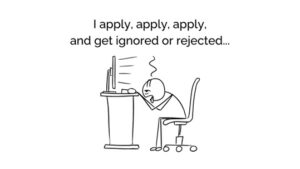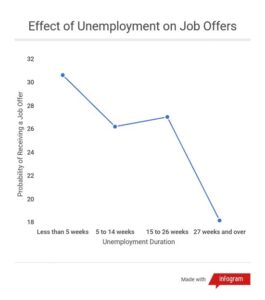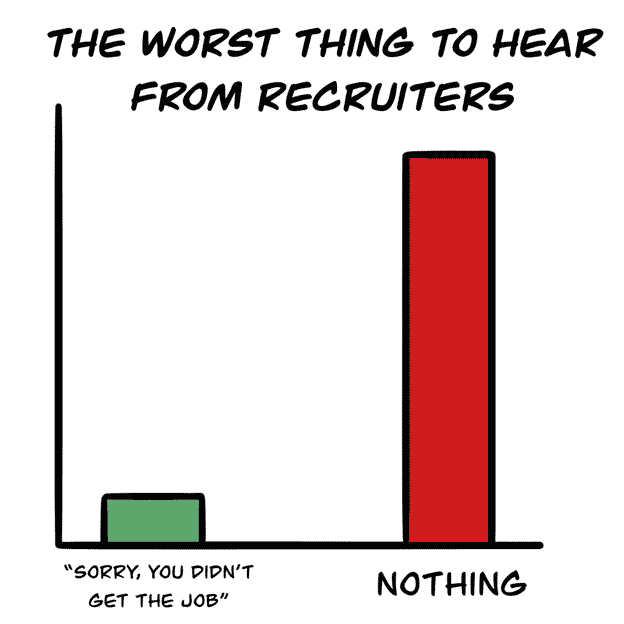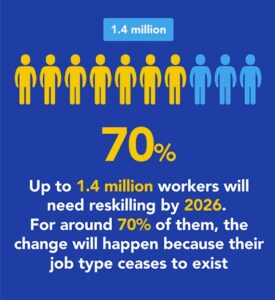Job hunting can be a stressful event. All of the company research, prepping for interviews, and being put on the hot seat can take its toll. Adding to the stress is when after all of the hard work is put in, you receive a rejection notice. It’s nerve-racking and upsetting, and can throw one’s world into a tailspin.

Ten Steps to Guide You in Handling Job Rejection
In order to cope and rebound from the traumatic experience of job rejection(s), consider the following ten steps. Read through these and consider what you can adopt now to help you better cope with rejection.
1. Accept That Life is Stressful
This is probably not the first step you were hoping to find. But we need to remember that stress is embedded into our work lives. In fact, in all of life we have struggles, pain, and broken plans. When we accept those as part of life, it makes it easier to get over. The same is true with work-related issues—including job rejections. According to WebMD, 40% of US workers admit to experiencing office stress. In addition, 25% say work is the biggest source of stress in their lives. Steps to help reduce stress are helpful, but stress will always be a part of life.
The first step in getting over a job rejection is to accept that stress is part of the journey.
Receiving a rejection notice from a company is painful. It brings back hurtful feelings from high school breakups or not making a sports team. Rejection can sting and takes a bite out of one’s confidence. But it is only painful if we allow it to be. On the surface, that reads like phony, positive mental attitude BS, but it’s really not. Job seeking and interviewing is a business transaction, a sales job. And as any good salesperson will tell you, you can’t take rejection personally. You have to dust yourself off and go to the next sales call.
2. It’s Not All About You
Of course it sucks to receive a rejection letter, but know that you’re not the only one receiving one. Recent statistics reveal that depending on the organization, only a select few of job candidates can be hired. You may be qualified for the position, but so are many other candidates. Someone has to be cut from the process.
3. Be Patient
Waiting for an answer from an employer takes time. In fact, the entire hiring process, from research to interview takes a lot of time. According to Zippia, it takes the average person 24 weeks to go through the hiring and find a job. Take a deep breath and relax. The job-hunting process is a journey. If you get hired right away, great! But if not, understand that time is not your enemy, but a friend. Embrace the thrill of the hunt.
4. Keep Working
If you can hang on to your current employment, it could help you with your job hunting. Zippia also found that unemployed people have a harder time securing job interviews and getting hired. The probability of receiving a job offer decreases the longer a person is unemployed. If you lose your current job, get another one as a stand-in while you continue to look for your dream job. It pays in more ways than one to stay employed.

5. Perhaps it’s Just Not Meant to Be
When you receive a rejection notice, consider that maybe its just not to be for you at this time. Keep in mind that people have been hired by the same company that at one time rejected them. For you, at this moment in time, the job might not be a good fit all around. Not getting selected to move on in the interview process may have nothing to do with you. The job might be in the process of being revamped. Maybe they decided to hire from within. Or, perhaps a close relative of the HR director wanted the position.
-
Consider Making Adjustments in Your Approach
If you are receiving multiple rejection notices, consider changing your approach or interviewing style. Bounce off ideas with friends and family. Practice mock interviews with mentors or an HR professional. Review your social media pages—employers are looking at them. What can you change, update or eliminate? If you haven’t created an elevator pitch yet, do so now. Practice it over and over again. Also, consider all the questions an interviewer might ask and visualize how you would respond.
-
Get Detailed Feedback
If possible, ask the company why you were rejected and how they think you can
do better next time. Be prepared though. Some employers may be too busy to cater to your request. Those that do are impressed that you asked them for feedback. Even if their response is that they found a better qualified candidate, ask them for specifics. Let them know you understand there was someone else better qualified, but what can you do to be better qualified.

These questions provides two positive outcomes: First, the employer may remember that you took the initiative to try to better yourself. Second, you learn what is needed to be better qualified or how to perform better in the next interview. Either way, you come out a winner better prepared for the next opportunity.
-
Refine Your Research
If you get rejected and receive feedback, you might find the job wasn’t suited for you in the first place. Going forward, be sure to review the job specifications before applying. If you are not excited about the position and can’t see yourself in that role, the interviewer senses it too. You will send off vibes picked up by the employer. You might smile and give good answers, but your heart is not in it.
Next time, look for a job that is close to your ambition and aspiration. Go for the interview for a job that meets your expectations. To do this, refine your research for a specific job. Make a list of the key things you want in a job. If the specifications for the job you’re applying for doesn’t have those, move on. You are wasting your time and the employer’s time. Find the job you can see yourself doing, apply for it, and knock their socks off in the interview.
-
Rebuild Self-Confidence and Strength
A rejection notice is like a punch in the gut—it knocks the wind out of you. Be mad, sad, and frustrated for a little while, then get back in the game. To become successful, you must become resilient to survive in this rapidly changing world. Economies and job markets change. As of this writing jobs are in abundance with not enough workers to fill openings, especially in the hospitality industry. Tell yourself that you are a value to whoever hires you.
Right now you need a win. But until then remember that any job rejection does not define you. Instead of being disappointed, try to restore your self-confidence. Know that overcoming barriers on your way to success will lead you to the right role. Visit self-motivating sites, read motivational books and hang out with people who are uplifting. We all reach points of being down and out. That becomes a problem when we stay there. Look for the bright side of every setback. You may have heard it said that if you fall into a mud puddle, check your pockets for a fish.
-
Move Forward
In his best-selling book, Failing Forward, John C. Maxwell says to, “Fail early, fail often, and fail forward.” Maxwell is saying that we are all going to fail at something—that is all part of life too. What we do with that failure is what makes the difference between success and wallowing in our failure. To fail forward we should remember that:
- Even if the rejection isn’t your fault, take responsibility for your future success
- The only way to make failure useful is to learn from it
- Focus on three things to make the most of the opportunities you get
Always remember that a job rejection letter is a moment, not a monument. Don’t make it your lifelong label. Instead, use what you’ve learn, pull up your britches, move forward, and keep moving.

